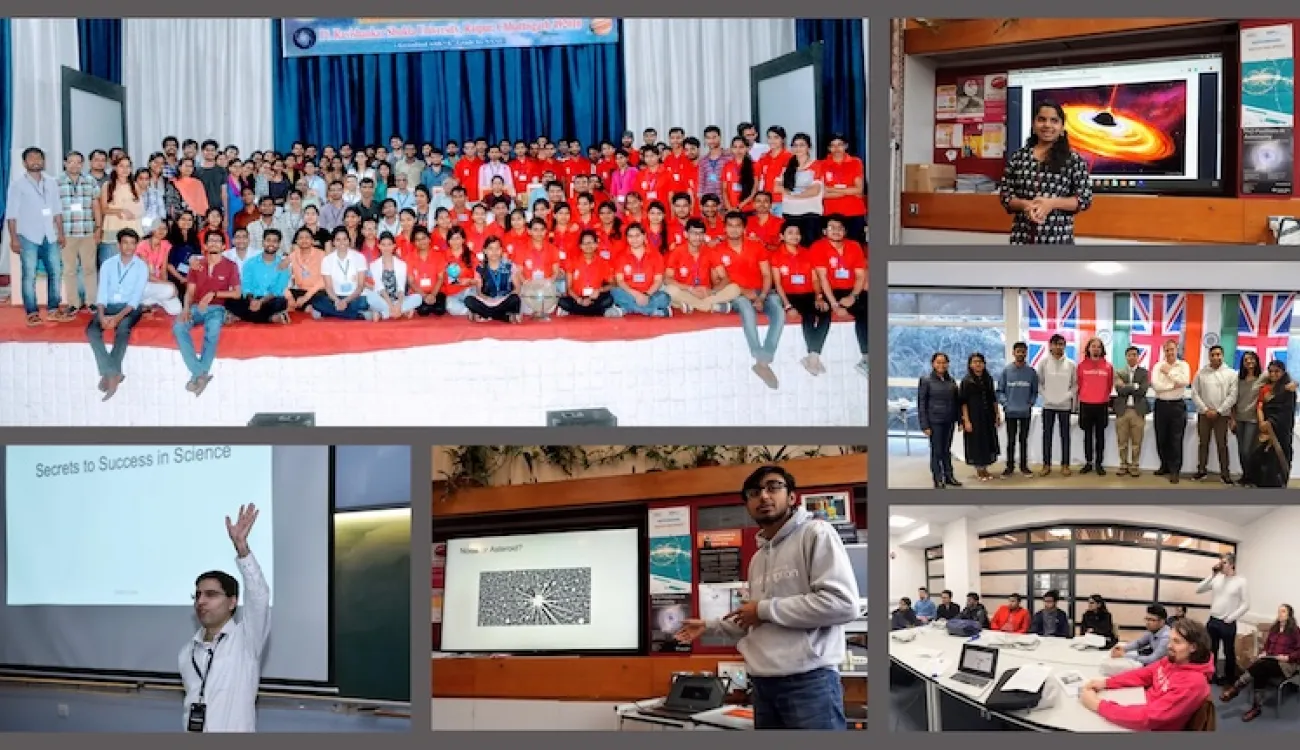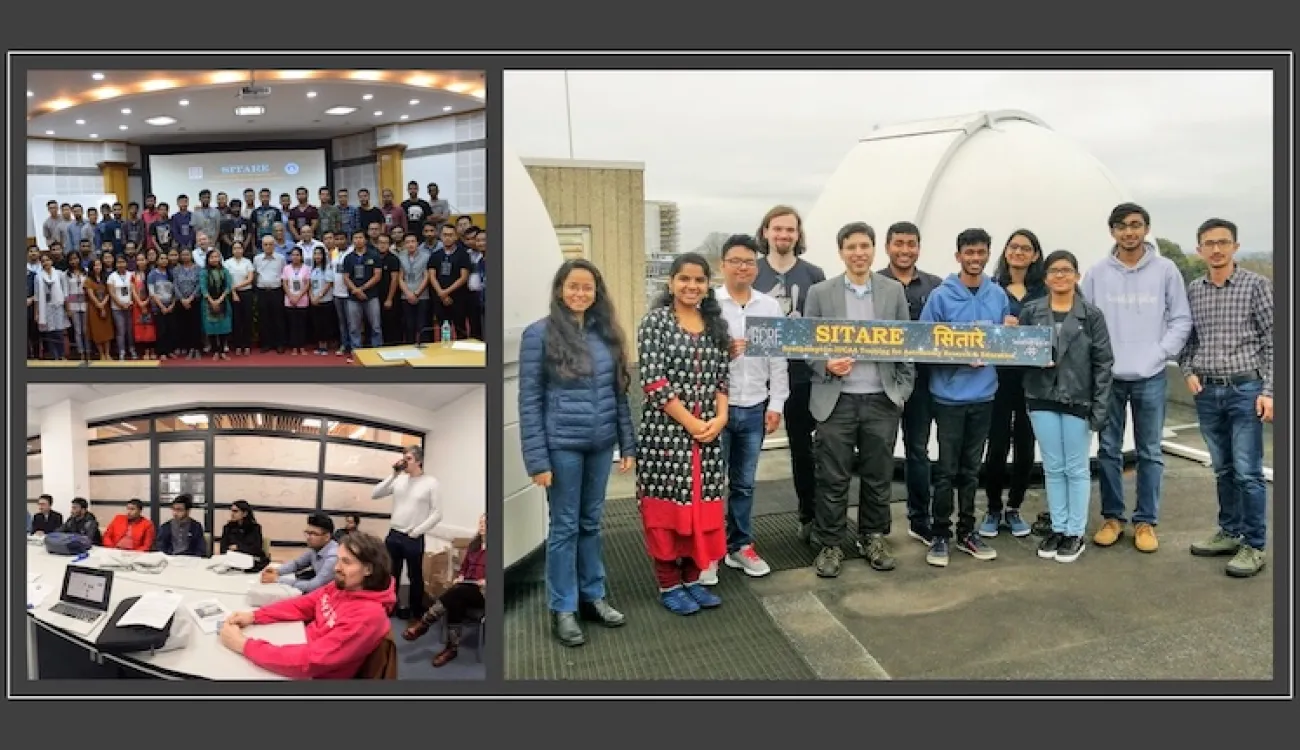Blue Skies Capacity Building of Future Research Stars
Project: SITARE: The Southampton-IUCAA Training for Astrophysics Research and Education
Lead Researcher: Professor Poshak Gandhi, Professor of Astrophysics at the School of Physics & Astronomy.
Background
SITARE. the Southampton – IUCAA Training for Astrophysics Research and Education (and meaning “stars” in Hindi) – is a blue-skies capacity-building initiative led jointly by the University of Southampton School of Physics and Astronomy, University of Southampton with the Inter-University Centre for Astronomy & Astrophysics (IUCAA), Pune. Funded by the Science and Technology Facilities Council (STFC) Global Challenges Research Fund, SITARE delivered high-quality training in blue-skies research to students in India and Nepal, widening access to advanced STEM pathways beyond major metropolitan centres.
Key Objectives
Professor Gandhi’s research has four inter-related objectives:
- Deliver high-quality introduction to quality education and research in remote hubs in the Indian sub-continent, outside big cities, aligned with the UN’s sustainable development goals.
- Equip the next generation of budding scientists with confidence and introductory skills necessary for a career in STEM research.
- Build a fair and transparent pipeline from local workshops to national and international research environments.
- Strengthen Indo-UK collaboration through shared teaching, mentoring, and short research projects.
Approach
SITARE used a three-tier model workflow: (1) regional, in-person workshops hosted by local universities; (2) a national residential training camp at IUCAA; and (3) a two-week visit to Southampton for top performers to complete mini-projects and present their work. This structure balanced breadth (large regional cohorts) with depth (intensive mentoring for selected trainees).

Reach and Locations
Phase 1 delivered workshops at:
- Tezpur University, Assam (2–4 May 2018);
- Tribhuvan University, Kathmandu, Nepal (13–15 June 2018);
- Pandit Ravishankar Shukla University, Raipur, Chhattisgarh (17–19 August 2018); and
- Department of Physics, Newman College, Thodupuzha, Kerala (17–19 September 2018).
Each hub drew students from surrounding regions; content spanned fundamentals (black holes, X-ray astronomy, galaxy evolution, gravitational waves) and practicals (Virtual Observatory tools, AstroSat data, coding labs). Public-engagement lectures (e.g. in Raipur) extended reach to families and local communities.
Outcomes and Impact
- 600 students trained at regional level; ~100 progressed to the national camp; 8 were selected for the UK stage.
- 40% of final-stage participants applied for international PhD programmes; at least four secured offers following SITARE.
- A self-sustaining “SITARE Network” formed for peer support and knowledge-exchange, especially during COVID-era disruptions.
These outcomes clearly demonstrate that short, well-structured interventions can successfully guide talented students from underserved regions into global research pipelines.
Equality, Diversity and Inclusion (EDI)
SITARE embedded EDI from inception: 35% (minimum) participation by women across stages, diverse role models (including female faculty and local lecturers), and deliberate geographic inclusion of remote and non-metro institutions. The programme normalised research as an aspirational career path through mentoring and community-facing events.
Partnerships and Leadership
The programme was co-delivered by the University of Southampton and IUCAA, with local hosting by partner universities and colleges.
IUCAA provided staff time, logistics and national-camp infrastructure; Southampton coordinated curriculum design, mentoring and the UK research visit. Collaboration with Pune University/Pune Knowledge Cluster broadened the data-science strand.

Future Directions
SITARE provides a replicable template for low-cost, high-impact scientific capacity building: regional hubs, a national residential tier, and a final research-immersion stage, underpinned by an alumni network.
With India and Nepal investing in frontier facilities (e.g. LIGO-India, AstroSat operations, Moon-science initiatives and international telescope partnerships), SITARE alumni are well placed to contribute to long-term scientific and socio-economic dividends.
Contact
For collaboration, alumni stories or press enquiries, please contact Professor Poshak Gandhi, Physics & Astronomy and India Centre (Poshak.Gandhi@soton.ac.uk) or Professor Ranjeev Misra, IUCAA (rmisra@iucaa.in)
Useful weblinks
- https://www.southampton.ac.uk/stag/news/2018/02/19-sitare.page
- https://www.tezu.ernet.in/dphy/home/activities/SITARE.php
- https://www.sentinelassam.com/amp/news/training-programme-kick-starts
- https://assamtribune.com/sitare-project-aiming-to-seed-growth-of-future-astrophysicists-in-asia
- https://www.facebook.com/iucaapune/posts/the-sitare-workshop-jointly-organised-by-the-university-of-southampton-and-iucaa/1145825892252424/
- https://www.phys.soton.ac.uk/news/5554
- https://www.thebridgechronicle.com/pune/sitare-project-aims-rigorous-research-students-gandhi-10597